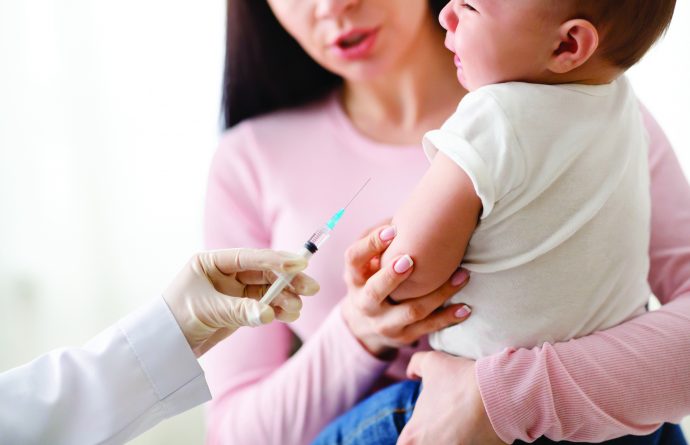Babies and children under five years old are vulnerable to infectious diseases as their immune system is not fully developed yet. It is best to give your child’s immune system a little help with protection against certain diseases when he is ready to explore the world out there.
Babies receive antibodies from mum (passed through the placenta, and later on via breastmilk). However, newborns and infants face a higher risk of infection because these antibodies do not provide them with full protection, and maternal antibodies only last about nine months.
As your baby grows and matures, his immune system will gradually become stronger, but it’s important that it receives extra protection, in the form of vaccinations, against potentially deadly diseases that can overwhelm an unprepared immune system.
Vaccine-preventable diseases
A child falling ill is not an unusual occurrence as most children get sick several times a year, with ailments such as the common cold, ear infections, etc. Worse still, part of an infant’s development includes putting things into their mouths which increases the risk of infection. They are at the mercy of any germ in the environment, carriers (people with a disease who show no symptoms, also referred to as asymptomatic or pre-symptomatic individuals), and contaminated objects/ toys/surfaces, etc.
Here are some vaccine-preventable childhood infections with potentially serious consequences:
Diphtheria: The bacteria produces a toxin that enters the blood and can damage the heart, kidneys, and nervous system. If the airways are badly affected, the child’s breathing may be cut off, resulting in death.
Tetanus: Can cause severe muscle spasms resulting in broken bones. May also affect vocal cords, cause breathing difficulties and abnormal heart rhythms, especially worse in younger children.
Pertussis: Babies (<6 months) may not cough but have difficulty breathing, leading to breath-holding and turning blue. Not every child will develop the ‘whooping’ sound – see a doctor for any prolonged coughs/colds.
Hepatitis B: Infections that last >6 months can lead to chronic liver problems, including liver failure. It may also potentially cause liver cancer.
Polio: Non-paralytic polio may cause pain and/or muscle stiffness along the neck and spinal area. Paralytic polio can paralyse certain muscle groups, e.g. muscles used for breathing or leg muscles. Post-polio syndrome occurs years after recovery. The previously affected muscles will gradually weaken and waste away.
Hib (Haemophilus influenza Type B): A possible complication is meningitis, which may cause brain damage.
Measles: A common complication is ear infections that may cause permanent hearing loss. A common long term sequelae is subacute sclerosing panencephalitis (SSPE). It progresses slowly but damages and scars the brain.
Mumps: Complications include:
- Inflammation of the testicles (orchitis) or ovaries (oophoritis).
- Orchitis can be painful and may lead to a decrease in testicular size but seldom causes sterility.
- Encephalitis and meningitis (membrane inflammation surrounding the brain and spinal cord).
Rubella: Seldom causes severe problems in children. Pregnant women who are infected early during pregnancy face a 1 in 5 chance of problems, e.g. miscarriages and serious birth defects.
Many of these diseases are less common nowadays as they have long been included in our National Immunisation Programme (NIP). However, these diseases have remained a problem. Unfortunately, there are some parents who refuse to vaccinate their child and this has led to small outbreaks occurring from time to time. Relying solely on herd immunity is not a good idea as your child can be exposed to the disease (via a carrier or someone who is infected) at any time.
Vaccination is the best option
To prevent both the disease and its complications, protection from exposure is important. Speak to your child’s paediatrician to learn more about why vaccinations should not be skipped or to find out how you can vaccinate your child against these common childhood infectious diseases.
Remember that vaccination saves lives. While it will not guarantee complete immunity from the disease, your child need not suffer as much if he gets infected. There is a big difference compared to an unvaccinated child who will be in great pain and may possibly face death. The very least that we can do is to protect our child and prevent potential diseases from occurring, and to minimise the risk of infection as much as possible.
Fake news! The claim that SSPE is caused by the measles vaccine is false. Studies show that the measles vaccine prevents measles thus also prevents SSPE.
An educational contribution by Malaysian Paediatric Association.






Comments